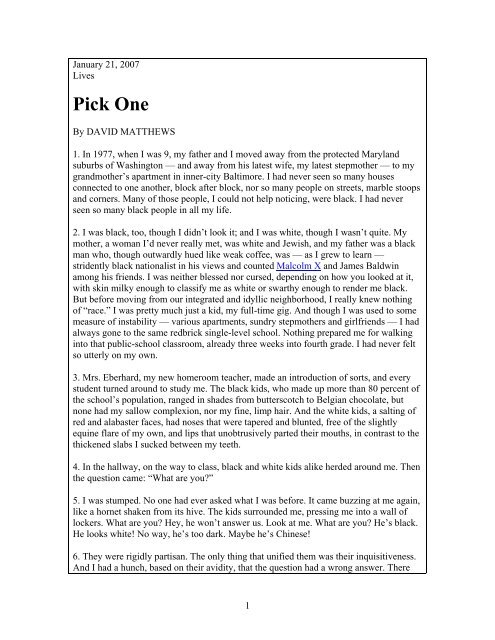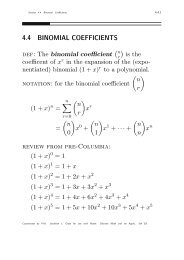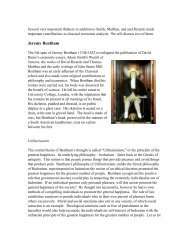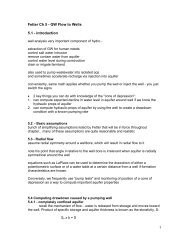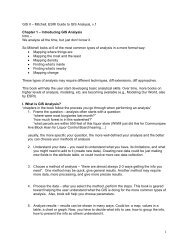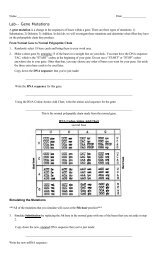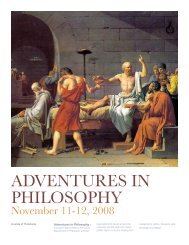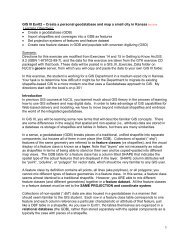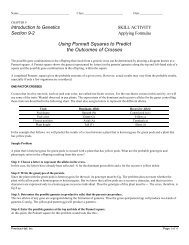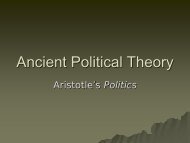Pick One by David Matthews
Pick One by David Matthews
Pick One by David Matthews
You also want an ePaper? Increase the reach of your titles
YUMPU automatically turns print PDFs into web optimized ePapers that Google loves.
January 21, 2007<br />
Lives<br />
<strong>Pick</strong> <strong>One</strong><br />
By DAVID MATTHEWS<br />
1. In 1977, when I was 9, my father and I moved away from the protected Maryland<br />
suburbs of Washington — and away from his latest wife, my latest stepmother — to my<br />
grandmother’s apartment in inner-city Baltimore. I had never seen so many houses<br />
connected to one another, block after block, nor so many people on streets, marble stoops<br />
and corners. Many of those people, I could not help noticing, were black. I had never<br />
seen so many black people in all my life.<br />
2. I was black, too, though I didn’t look it; and I was white, though I wasn’t quite. My<br />
mother, a woman I’d never really met, was white and Jewish, and my father was a black<br />
man who, though outwardly hued like weak coffee, was — as I grew to learn —<br />
stridently black nationalist in his views and counted Malcolm X and James Baldwin<br />
among his friends. I was neither blessed nor cursed, depending on how you looked at it,<br />
with skin milky enough to classify me as white or swarthy enough to render me black.<br />
But before moving from our integrated and idyllic neighborhood, I really knew nothing<br />
of “race.” I was pretty much just a kid, my full-time gig. And though I was used to some<br />
measure of instability — various apartments, sundry stepmothers and girlfriends — I had<br />
always gone to the same redbrick single-level school. Nothing prepared me for walking<br />
into that public-school classroom, already three weeks into fourth grade. I had never felt<br />
so utterly on my own.<br />
3. Mrs. Eberhard, my new homeroom teacher, made an introduction of sorts, and every<br />
student turned around to study me. The black kids, who made up more than 80 percent of<br />
the school’s population, ranged in shades from butterscotch to Belgian chocolate, but<br />
none had my sallow complexion, nor my fine, limp hair. And the white kids, a salting of<br />
red and alabaster faces, had noses that were tapered and blunted, free of the slightly<br />
equine flare of my own, and lips that unobtrusively parted their mouths, in contrast to the<br />
thickened slabs I sucked between my teeth.<br />
4. In the hallway, on the way to class, black and white kids alike herded around me. Then<br />
the question came: “What are you?”<br />
5. I was stumped. No one had ever asked what I was before. It came buzzing at me again,<br />
like a hornet shaken from its hive. The kids surrounded me, pressing me into a wall of<br />
lockers. What are you? Hey, he won’t answer us. Look at me. What are you? He’s black.<br />
He looks white! No way, he’s too dark. Maybe he’s Chinese!<br />
6. They were rigidly partisan. The only thing that unified them was their inquisitiveness.<br />
And I had a hunch, based on their avidity, that the question had a wrong answer. There<br />
1
was black or white. <strong>Pick</strong> one. Nowhere in their ringing questions was the elastic clause,<br />
mixed. The choice was both necessary and impossible: identify myself or have it done for<br />
me. I froze, and said nothing — for the time being.<br />
7. At lunchtime that first day, teetering on the edge of the cafeteria, my eyes scanned the<br />
room and saw an island of white kids in a sea of black faces. I didn’t contemplate the<br />
segregation; it was simply part of the new physical geography, and I was no explorer; I<br />
was a weak-kneed outsider, a yellowed freak.<br />
8. In some way I wasn’t fully aware of, urban black people scared me. I didn’t know how<br />
to play the dozens or do double Dutch. I didn’t know the one about how your mama’s so<br />
dumb she failed her pap test. I didn’t know that with the wrong intonation, or the wrong<br />
addressee, any mention of one’s mama could lead to a table-clearing brawl. The black<br />
kids at school carried a loose, effortless charge that crackled through their interactions.<br />
They were alive and cool. The only experience I had with cool had been vicarious,<br />
watching my father and his bebop-era revolutionary friends, and feeling their vague sense<br />
of disappointment when I couldn’t mimic their behavior. The black kids reminded me of<br />
home, but the white kids reminded me of myself, the me I saw staring back in the mirror.<br />
On that day, I came to believe that if I had said I was black, I would have had to spend<br />
the rest of my life convincing my own people.<br />
9. Lunch tray in hand, I made a final and (at least I like to tell myself) psychologically<br />
logical choice, one I would live with, and wrestle with, for a full decade to come: I<br />
headed toward the kids who looked most like me. Goofy bell-bottoms and matching<br />
Garanimals? Check. Seventies mop-top? Check. Then a ruddy boy with blond bangs<br />
lopped off at the eyebrows looked up from his Fantastic Four comic book, caught my eye<br />
across the cafeteria, scooched over in his seat and nodded me over.<br />
10. That was it. By the code of the cafeteria table, which was just as binding in that time<br />
and place as the laws of Jim Crow or Soweto, I was white.<br />
<strong>David</strong> <strong>Matthews</strong> is the author of “Ace of Spades,” a memoir to be published next month.<br />
This essay is adapted from the book.<br />
2


